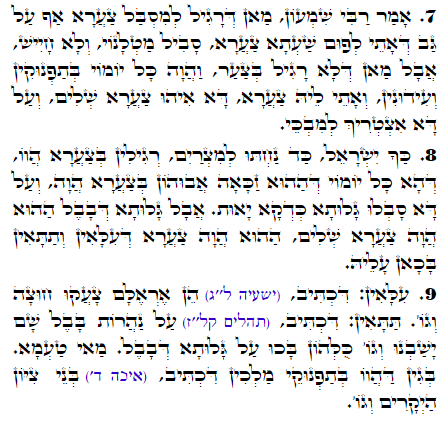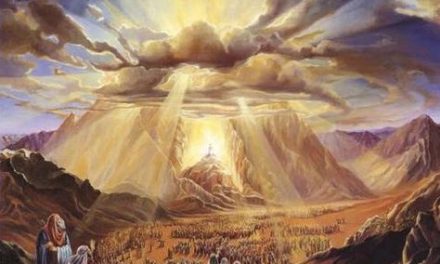Daily Zohar # 1712 – The true meaning of Zionism

.
Hebrew translation:
8. כָּךְ יִשְׂרָאֵל, כְּשֶׁיָּרְדוּ לְמִצְרַיִם הָיוּ רְגִילִים בְּצַעַר, שֶׁהֲרֵי כָּל יְמֵי אוֹתוֹ אֲבִיהֶם הַצַּדִּיק הָיוּ בְצַעַר, וְלָכֵן סָבְלוּ אֶת הַגָּלוּת כָּרָאוּי. אֲבָל גָּלוּת בָּבֶל הַהִיא הָיְתָה צַעַר שָׁלֵם, אוֹתוֹ הַצַּעַר שֶׁעֶלְיוֹנִים וְתַחְתּוֹנִים בָּכוּ עָלָיו.
9. עֶלְיוֹנִים, שֶׁכָּתוּב (ישעיה לג) הֵן אֶרְאֶלָּם צָעֲקוּ חֻצָה וְגוֹ’. תַּחְתּוֹנִים, שֶׁכָּתוּב (תהלים קלז) עַל נַהֲרוֹת בָּבֶל שָׁם יָשַׁבְנוּ וְגוֹ’, וְכֻלָּם בָּכוּ עַל גָּלוּת בָּבֶל. מָה הַטַּעַם? כִּי הָיוּ בְּתַפְנוּקֵי מְלָכִים, שֶׁכָּתוּב (איכה ד) בְּנֵי צִיּוֹן הַיְקָרִים וְגוֹ’.
.
Zohar Shemot
Rabbi Shimon teaches us that those who are used to suffering and a new pain come their way they just keep going with their lives. Those who are used to the pleasures of the world and some pain comes to them, it is considered as a complete sorrow and they should cry about it.
When the Israelites went down to Egypt they were already in sorrow and lower state because Jacob lived most of his life in suffering and grief for losing his wife, Rachel and his son Joseph. The exile in Egypt was not considered difficult.
After the destruction of the first Holy Temple the Israelite were exiled in Babylon. This exile was a difficult experience because the Israelites had a connection to the Holy Temple that provided flow of great light. After the destruction they lost that high connection and the sharp difference between the pleasures of being close to the Light and the darkness of the exile was very hard for them.
Psalms 137:1
“עַל נַהֲרוֹת, בָּבֶל–שָׁם יָשַׁבְנוּ, גַּם-בָּכִינוּ: בְּזָכְרֵנוּ, אֶת-צִיּוֹן”
“By the rivers of Babylon we sat and wept when we remembered Zion.”
Zion is the aspect of Yessod of Malchut. It is the spiritual connection of the light to the Holy Temple and Jerusalem. The entire world receives its share of light from the Light that comes from Zion.
When the Holy Temple existed we were called ‘precious sons of Zion’ because of the direct connection to the Light. After the destruction we are considered as empty earthly vessels.
Lamentation 4:2
“בְּנֵי צִיּוֹן הַיְקָרִים, הַמְסֻלָּאִים בַּפָּז–אֵיכָה נֶחְשְׁבוּ לְנִבְלֵי-חֶרֶשׂ, מַעֲשֵׂה יְדֵי יוֹצֵר”
“The precious sons of Zion, Weighed against fine gold, How they are regarded as earthen jars, The work of a potter’s hands!”
When the Torah is taken out from the Ark for the weekly reading we sing the words from the prophet Isaiah:
Isaiah 2:3
“כִּי מִצִּיּוֹן תֵּצֵא תוֹרָה, וּדְבַר-יְהוָה מִירוּשָׁלִָם”
Transliteration “ki mitzion tetze Torah, udevar-Adonai miyrushalaim”
“For the law (Torah) will go forth from Zion And the word of the YHVH from Jerusalem.”
When we sing this verse we should have the desire in our hearts to see the Light of the Endless coming out of Zion to the Third Holy Temple in Jerusalem.
Psalms 126:1
“שִׁיר, הַמַּעֲלוֹת:
בְּשׁוּב יְהוָה, אֶת-שִׁיבַת צִיּוֹן– הָיִינוּ, כְּחֹלְמִים”
“A song of ascend; When YHVH returned and restores the exile of Zion, it was as if we were dreaming.”
We sing this important Psalms before the blessings of the meal, ‘Birkat hamazon’. These blessings include another mention of Zion and Jerusalem because our main goal is to draw the light with our desires to Zion and Jerusalem, bringing final and lasting peace for the entire world. That is the true meaning of Zionism.
{||}


